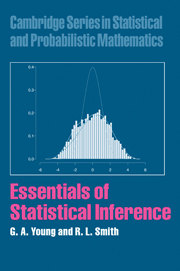Book contents
7 - Two-sided tests and conditional inference
Published online by Cambridge University Press: 06 July 2010
Summary
This chapter is concerned with two separate but interrelated themes. The first has to do with extending the discussion of Chapter 4 to more complicated hypothesis testing problems, and the second is concerned with conditional inference.
We will consider first testing two-sided hypotheses of the form H0 : θ ε [θ1, θ2] (with θ1 < θ2) or H0 : θ = θ0 where, in each case, the alternative H1 includes all θ not part of H0. For such problems we cannot expect to find a uniformly most powerful test in the sense of Chapter 4. However, by introducing an additional concept of unbiasedness (Section 7.1), we are able to define a family of uniformly most powerful unbiased, or UMPU, tests. In general, characterising UMPU tests for two-sided problems is a much harder task than characterising UMP tests for one-sided hypotheses, but for one specific but important example, that of a one-parameter exponential family, we are able to find UMPU tests. The details of this are the subject of Section 7.1.2.
The extension to multiparameter exponential families involves the notion of conditional tests, discussed in Section 7.2. In some situations, a statistical problem may be greatly simplified by working not with the unconditional distribution of a test statistic, but the conditional distribution given some other statistic. We discuss two situations where conditional tests naturally arise, one when there are ancillary statistics, and the other where conditional procedures are used to construct similar tests. The basic idea behind an ancillary statistic is that of a quantity with distribution not depending on the parameter of interest.
- Type
- Chapter
- Information
- Essentials of Statistical Inference , pp. 98 - 119Publisher: Cambridge University PressPrint publication year: 2005



